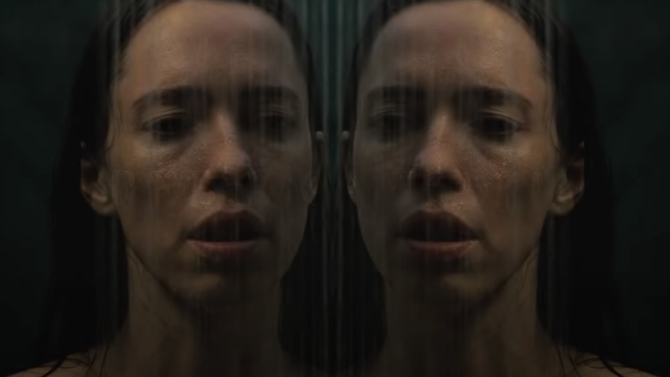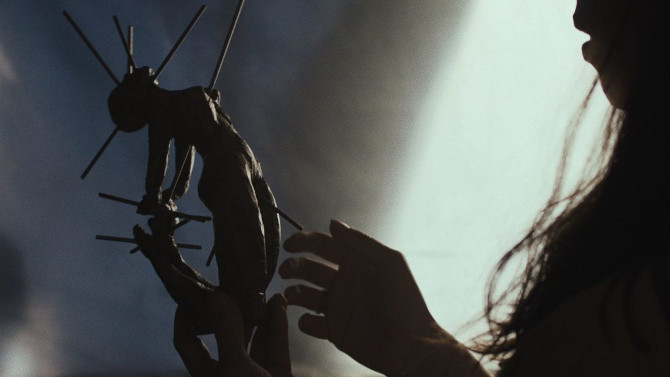Almost as if Sigmund Freud, Edgar Allan Poe and Alfred Hitchcock got together to make a movie (Roman Polanski could probably be thrown into the group for good measure), 2020’s The Night House lives in the realm of the double, the uncanny, as well as the horror found in grief and the chasm of nothingness it can bring with it.
Written by Ben Collins and Luke Piotrowski, and directed by David Bruckner, the story follows teacher Beth (Rebecca Hall), the audience joining her immediately after the suicide of her husband, Owen (Evan Jonigkeit). Living in a bluff-top lake house that he himself built (the reflective water perhaps the first indication of the double), she might as well be out at sea. . . though she might not want that, as Owen killed himself on the water. And, when the darkness of night comes, Beth’s world feels like an encased glass tomb.
Though she does have a helpful neighbour, Mel (Vondie Curtis-Hall) – another echo finds the man having lost his wife recently, and caring friend, Claire (Sarah Goldberg), most of the time she remains in the house Owen built.
As if tied to that place, Beth begins to feel a presence. . . the film makers painstakingly adding the illusion that someone might just be there – practical effects like trompe-l’oeil fused with some camera tricks will have the audience thinking they might be seeing something at every other turn. Likewise, weird anomalies pop up – the dock door always reopening, noticeable wet footsteps seen where no one is/was, her sound system unexpectedly turning on – ringing through the house, while a slew of secrets Owen kept hidden from her are soon found. Beth also finds herself sleepwalking in a bizarre, backwards world – these reveries slowly revealing further skeletons that Owen hid in numerous cupboards (or floorboards). As if not bad enough, the mirrors and windows in her house serve to cloak us – further reminders of the double and this reflective backwards world.
A true slow burner, very little is revealed quickly. Like watching the gunpowder being lit and leisurely winding its way to that ready-to-blow powder keg, we are part of Beth’s unnerving journey, and there is nothing we can do but join her on it. Each clue leads her further down that explosive path, an all enveloping journey into the recesses of the brain that deal with depression, paranoia, and abject fear. Built around her own past experiences, a gaping abyss of nothingness is where this all might lead if she is not careful.
Like a circle, but sometimes in reverse, the path is the same, but reverberates differently. In one of her fugue states, she sees the mirror image of her house on the other side of the lake – something she is now sure must exist. Another eerie reveal finds Beth discovering an image of a woman that looks just like her on Owen’s cellphone. . . but she is sure it isn’t her (as she doesn’t own those clothes). Other lookalike photo discoveries follow. . . and the finding of some occult books lead her to a bookstore in the city. . . where one of the employees is Madelyne (Stacy Martin) – one of her look-alikes.
Cerebral as well as subtle, where nothing is fully spelled out, The Night House is unlike many modern horror movies. It lives in the cracks of our psyche, exposing the primordial fear of the unknown – ‘what comes after death?’, ‘can we truly know our partner?’, ‘can we ever escape our preordained fate?’. It really isn’t about the supernatural (though you can argue with your friends and family as to whether there actually is ‘something’ in this film. . . or if it is all in Beth’s own personality), but rather life and death, mania and depression (Beth exhibits both, in fact), truth and self reconciliation, and so much more.
Featuring a few mighty jump scares for good measure, The Night House is an anomaly of a horror film – and I mean that in a refreshing and creative sense. Living in the least rational part of our mind, it plays with our fears, revealing the dark roots of human existence and suffering. Though that is not to say that there is no hope. Lastly, it needs to be said that Rebecca Hall is fantastic – carrying much of the film on her own (that is, if we don’t count the house). So, if you’ve been yearning for doppelgängers, the uncanny, psychological suspense, and the lost love themes found in the works of the above three (or four) masterminds, explore this night house – I can assure you that it is not an imitation.





